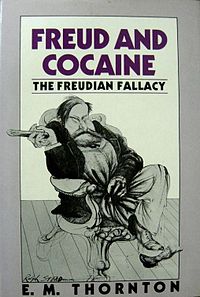The Freudian Fallacy

Cover of the first edition
|
|
| Author | Elizabeth M. Thornton |
|---|---|
| Country | United Kingdom |
| Language | English |
| Subject | Sigmund Freud |
| Published | 1983 (Blond and Briggs) |
| Media type | Print (Hardcover and Paperback) |
| Pages | 351 (1986 Paladin edition) |
| ISBN | |
The Freudian Fallacy, first published in the United Kingdom as Freud and Cocaine, is a 1983 book about Sigmund Freud by medical historian Elizabeth M. Thornton, in which Thornton argues that Freud became a cocaine addict and that his theories resulted from his use of cocaine. The book received several negative reviews, and some criticism from historians, but has been praised by authors critical of psychoanalysis.
Thornton, a medical historian, calls Freud "a false and faithless prophet" and his theories "baseless and aberrational." She argues that Freud became a cocaine addict and that his theories were shaped by this addiction. She believes that Freud's ideas were the direct outcome of his use of cocaine, "a toxic drug with specific effects on the brain." She argues that the unconscious mind does not exist. She also deals with Freud's relationship to Jean-Martin Charcot and criticizes the concept of hysteria, arguing that many of the conditions Freud diagnosed as hysteria were actually organic illnesses that either Freud himself or 19th century medicine as a whole failed to recognize. In her view, agoraphobia is invariably caused by disorders of the inner ear which affect the sense of balance.
The Freudian Fallacy received negative reviews in The Times Literary Supplement and the London Review of Books, the latter of which included a false accusation of anti-Semitism that was later withdrawn with an apology. Thornton's claims about Freud's addiction to cocaine received some coverage in The Sunday Times Magazine. Thornton's book was criticized by historians Peter Gay, who described it as "a model in the literature of denigration" in Freud: A Life for Our Time (1988), and Roy Porter, who called it "tendentious". However, The Freudian Fallacy was praised by psychologist Hans Eysenck in Decline and Fall of the Freudian Empire (1985), and has also received praise from other writers critical of psychoanalysis. Social and cultural theorist Todd Dufresne described The Freudian Fallacy as a notable work on the history of psychoanalysis, and the single best work on Freud's cocaine period.
...
Wikipedia
